- Home
- Brand, Max
Bull Hunter Page 4
Bull Hunter Read online
Page 4
Bull Hunter set his teeth, for there was no longer a possibility of cutting off Pete Reeve by crossing country. The immense labors of the last three days had merely served to put him on the heels of the horseman, and now he must follow straight down country and attempt to match his long legs against the speed of a fine horse. He drew a deep breath and plunged into the night out of Glenn Crossing, on the south trail. At least he would make one short, stiff march before the weariness overtook him.
That weariness clouded his brain ten miles out. He built a fire in a cover of pines and slept beside it. Before dawn he was up and out again. In the first gray of the daylight he reached a little store at a crossroad, and here he paused for breakfast. A tousled girl, rubbing the sleep out of her eyes, served him in the kitchen. The first glimpse of the hollow cheeks and the unshaven face of Bull Hunter quite awakened her. Bull could feel her watching him, as she glided about the room. He sunk his head between his shoulders and glared down at the table. No doubt she would begin to gibe at him before long. Most women did. He prepared himself to meet with patience that incredible sting and penetrating hurt of a woman's mockery.
But there was no mockery forthcoming. The sun was still not up when he paid his bill and hastened to the door of the old building. Quick footsteps followed him, a hand touched his shoulders, and he turned and looked suspiciously down into the face of the girl. It was a frightened face, he thought, and very pretty. At some interval between the time when he first saw her and the present, she had found time to rearrange her hair and make it smooth. Color was pulsing in her cheeks.
"Stranger," she said softly, "what are you running away from?"
The question slowly penetrated the mind of Bull; he was still bewildered by the change in her-something electric, to be felt rather than noted with the eye.
"They ain't any reason for hurrying on," she urged. "I-I can hide you, easy. Nobody could find where I'll put you, and there you can rest up. You must be tolerable tired."
There was no doubt about it. There was kindness as well as anxiety in her voice. For the second time in his entire life, Bull decided that a woman could be something more than an annoyance. She was placing a value on him, just as Jessie, three days before, had placed a value on him; and it disturbed Bull. For so many years, he had been mocked and scorned by his uncle and cousins that deep in his mind was engraved the certainty that he was useless. He decided to hurry on before the girl found out the truth.
"I can still walk," he said, "and, while I can walk, I got to go south. But-you gimme heart, lady. You gimme a pile of heart to keep going. Maybe"-he paused, uncertain what to say next, and yet obviously she expected something more-"I'll get a chance to come back this way, and if I do, I'll see you! You can lay to that-I'll see you!"
He was gone before she could answer, and he was wondering why she had looked down with that sudden color and that queer, pleased smile. It would be long before Bull understood, but, even without understanding, he found that his heart was lighter and an odd warmth suffused him.
The rising of the sun found him in the pale desert with the magic of the hills growing distant behind him, and he settled to a different step through the thin sand-a short, choppy step. His weight was against him here, but it would be even a greater disadvantage to a horseman, and with this in mind, he pressed steadily south.
Every day on that south trail was like a year in the life of Bull. Heat and thirst wasted him, the constant labor of the march hardened his muscles, and he got that forward look about his eyes, which comes with shadows under the lids and a constant frown on the forehead. It was long afterward that men checked up his march from date to date and discovered that the distance between the shack of Bill Campbell and Halstead in the South was one hundred and fifty miles over bitter mountains and burning desert, and that Bull Hunter had made the distance in five days.
All this was learned and verified later when Bull was a legend. When he strode into Halstead on that late afternoon no one had ever heard of the man out of the mountains. He was simply an oddity in a country where oddities draw small attention.
Yet a rumor advanced before Bull. A child, playing in the incredible heat of the sun, saw the dusty giant heaving in the distance and ran to its mother, frightened, and the worn-faced mother came to the porch and shaded her eyes to look. She passed on the word with a call that traveled from house to house. So that, when Bull entered the long, irregular street of Halstead, he found it lined on either side by children, old men, women. It was almost as though they had heard of the thing he had come to do and were there to watch.
Bull shrank from their eyes. He would far rather have slipped around the back of the village and gone toward its center unobserved. A pair of staring eyes to Bull was like the pointing of a loaded gun. He put unspoken sentences upon every tongue, and the sentences were those he had heard so often from his uncle and his uncle's sons.
"Too big to be any good."
"Bull's got the size of a hoss, and as a hoss he'd do pretty well, but he ain't no account as a man."
His life had been paved with such burning remarks as these. Many an evening had been long agony to him as the three sat about and baited him. He hurried down the street, the pulverized sand squirting up about his heavy boots and drifting in a mist behind him. When he was gone an old man came out and measured those great strides with his eye and then stretched his legs vainly to cover the same marks. But this, of course, Bull did not see, and he would not have understood it, had he seen, except as a mockery.
He paused in front of the hotel veranda, an awful figure to behold. His canvas coat was rolled and tied behind his sweating shoulders; his too-short sleeves had bothered him and they were now cut off at the elbow and exposed the sun-blackened forearms; his overalls streamed in rags over his scarred boots. He pushed the battered hat far back on his head and looked at the silent, attentive line of idlers who sat on the veranda.
"Excuse me, gents," he said mildly. "But maybe one of you might know of a little gent with iron-gray hair and a thin face and quick ways of acting and little, thin hands." He illustrated his meaning by extending his own huge paws. "His name is Pete Reeve."
That name caused a sharp shifting of glances, not at Bull, but from man to man. A tall fellow rose. He advanced with his thumbs hooked importantly in the arm holes of his vest and braced his legs apart as he faced Bull. The elevation of the veranda floor raised him so that he was actually some inches above the head of his interlocutor, and the tall man was deeply grateful for that advantage. He was, in truth, a little vain of his own height, and to have to look up to anyone irritated him beyond words. Having established his own superior position, he looked the giant over from head to foot. He kept one eye steadily on Bull, as though afraid that the big man might dodge out of sight and elude him.
"And what might you have to do with Pete Reeve?" he asked. "Mightn't you be a partner of Pete's? Kind of looks like you was following him sort of eager, friend."
While this question was being asked, Bull saw that the line of idlers settled forward in their chairs to hear the answer. It puzzled him. For some mysterious reason these men disapproved of any one who was intimately acquainted with Pete Reeve, it seemed. He looked blandly upon the tall man.
"I never seen Pete Reeve," said Bull apologetically.
"Ah? Yet you're follerin' him hotfoot?"
"I was aiming to see him, you know," answered Bull.
The tall man regarded him with eyes that began to twinkle beneath his frown. Then he jerked his head aside and cast at his audience a prodigious wink. The cloudy eyes of Bull had assured him that he had to do with a simpleton, and he was inviting the others in on the game.
"You never seen him?" he asked gruffly, turning back to Bull. "You expect me to believe talk like that? Young man, d'you know who I am?"
"I dunno," murmured Bull, overawed and drawing back a pace.
The action drew a chuckle from the crowd. Some of the idlers even rose and sauntered to the edge of
the veranda, the better to see the baiting of the giant. His prodigious size made his timidity the more amusing.
"You dunno, eh?" asked the other. "Well, son, I'm Sheriff Bill Anderson!" He waited to see the effect of this portentous announcement.
"I never heard tell of any Sheriff Bill Anderson," said Bull in the same mild voice.
The sheriff gasped. The idlers hastily veiled their mouths with much coughing and clearing of the throat. It seemed that the tables had been subtly turned upon the sheriff.
"You!" exclaimed the sheriff, extending a bony arm. "I got to tell you, partner, that I'm a pile suspicious. I'm suspicious of anybody that's a friend of Pete Reeve. How long have you knowed him?"
Bull was very anxious to pacify the tall man. He shifted his weight to the other foot. "Something less'n nothing," he hastened to explain. "I ain't never seen him."
"And why d'you want to see him? What d'you know about him?"
It flashed through the mind of Bull that it would be useless to tell what he knew of Pete. Obviously nobody would believe what he could tell of how Reeve had met and shot down Uncle Bill Campbell. For Bill Campbell was a historic figure as a fighter in the mountain regions, and surely his face must be bright even at this distance from his home. That he could have walked beyond the sphere of Campbell's fame in five days never occurred to Bull Hunter.
"I dunno nothing good," he confessed.
There was a change in the sheriff. He descended from the floor of the veranda with a stiff-legged hop and took Bull by the arm, leading him down the street.
"Son," he said earnestly, walking down the street with Bull, "d'you know anything agin' this Pete Reeve? I want to know because I got Pete behind the bars for murder!"
"Murder?" asked Bull.
"Murder-regular murder-something he'll hang for. And if you got any inside information that I can use agin' him, why I'll use it and I'll be mighty grateful for it! You see everybody knows Pete Reeve. Everybody knows that, for all these years, he's been going around killing and maiming men, and nobody has been able to bring him up for anything worse'n self-defense. But now I think I got him to rights, and I want to hang him for it, stranger, partly because it'd be a feather in my cap, and partly because it'd be doing a favor for every good, law-abiding citizen in these parts. So do what you can to help me, stranger, and I'll see that your time ain't wasted."
There was something very wheedling and insinuating about all this talk. It troubled Bull. His strangely obscure life had left him a child in many important respects, and he had a child's instinctive knowledge of the mental processes of others. In this case he felt a profound distrust. There was something wrong about this sheriff, his instincts told him-something gravely wrong. He disliked the man who had started to ridicule him before many men and was now so confidential, asking his help.
"Sheriff Anderson," he said, "may I see this Reeve?"
"Come right along with me, son. I ain't pressing you for what you know. But it may be a thing that'll help me to hang Reeve. And if it is, I'll need to know it. Understand? Public benefit-that's what I'm after. Come along with me and you can see if Reeve's the man you're after."
They crossed the street through a little maelstrom of fine dust which a wind circle had picked up, and the sheriff led Bull into the jail. They crossed the tawdry little outer room with its warped floor creaking under the tread of Bull Hunter. Next they came face to face with a cage of steel bars, and behind it was a little gray man on a bunk. He sat up and peered at them from beneath bushy brows, a thin-faced man, extremely agile. Even in sitting up, one caught many possibilities of catlike speed of action.
Bull knew at once that this was the man he sought. He stood close to the bars, grasping one in each great hand, and with his face pressed against the steel, he peered at Pete Reeve. The other was very calm.
"Howdy, sheriff," he said. "Bringing on another one to look over your bear?"
* * *
The cut proved, as he had said, to be a small thing; but it turned out that Diablo was far from won. He was haltered and he would carry Bull bareback. The saddle was quite another affair. So Bull returned to the idea of the barley sack, with gradual additions. On each side of the sack he attached hanging straps. Diablo snorted at these and tried them with his teeth. They reminded him vaguely of the swinging stirrups that had so often battered his tender sides. He discovered that the straps were not alive, however, and were not harmful. And when their length was increased and an uncovered stirrup was tied on each side, he gradually became accustomed to these also. The next stage was passing the straps under his belly. They were tied there loosely, the circle was completed, and Diablo, examining them critically, found nothing wrong. Then, a dozen times in a single evening, the straps were drawn up, tighter and tighter, until they touched him. At this he became excited, and it required all the resourcefulness of Bull to quiet him. But in three days the barley sack and its queer-looking additions had been changed for a true saddle-with the cinches drawn up tight enough for riding. And this without eliciting a single bucking spasm from Diablo!
Not even to Tod did Bull Hunter impart his great tidings. He had not yet climbed into that real saddle; Diablo had not yet heard the creak of the stirrup leathers under the weight of his rider. Indeed, there was still much to be done before the happy day when he saddled the black stallion and took down the bars of the corral gate and rode him out. And rode him without a bit! For on the point of steel in the mouth of Diablo, Bull Hunter knew that the horse would be against it resolutely. So he confined himself to a light hackamore alone. That was enough, for Diablo had learned to rein over the neck and stop at the slightest pull of the reins.
The next morning he went out to his work with a light heart. They had had the help of several new men during the past ten days and now the frame of the roof was almost completed. It would not be long before Bull's services could be dispensed with and he connected the idea of the completion of the barn in a symbolic fashion with the completion of his conquest of the stallion. The two would be accomplished in the same moment, as it were. No wonder, then, that as he climbed the ladder up the side of the barn, with the ladder quaking beneath his weight, Bull Hunter began to sing, his thundering bass ringing among the ranch buildings until Mrs. Bridewell opened the kitchen window to hear the better, and old Bridewell stopped his ears in mock dismay at the thunder of Bull's voice.
But the work was not two hours old when little Tod scampered up to his side.
"Bull," he whispered, "Hal Dunbar is down yonder with a couple of men. He's come to ride Diablo. What'll we do, Bull? What'll we do?"
"Diablo will throw him," said Bull with conviction.
"But he won't. He can't," stammered the boy in his excitement. "Nothing could throw Hal Dunbar. Wait till you see him! Just you wait till you see. Gee, Bull, he's as big as you and-"
The other qualifications were apparently too amazing to be adequately described by the vocabulary of Tod.
"If any other man can ride Diablo," said Bull at length, "I don't think I care about him so much. I've been figuring that I'm the only man who can get on his back. If somebody else can handle him, they're welcome to the horse as far as I'm concerned."
"Are you going to let him go like that?" Tod was bitter with shame and anger. "After all our work, are you going to give him up without a fight?"
"A fight would be a gunfight, and a gunfight ends up in a death," said Bull gently. "I don't like bloodshed, Tod!"
The boy writhed. Here was an idol smashed with a vengeance!
"I might of knowed!" he groaned. "You ain't nothing but-but a big hulk!"
And he turned on his heel and gave the exciting news to his father.
For an event of this caliber, Bridewell called down all his men from the building, and they started for the corral. Hal Dunbar and his two men already were standing close to the bars, and Diablo stood quivering, high-headed, in the center of the inclosure. But, of the picture, the attention of Bull Hunter centered mainly on Ha
l Dunbar.
His dreams of the man had been true. He was a huge fellow, as tall as Bull, or taller, and nearly as bulky. But about Bull Hunter there was a suggestion of ponderous unwieldiness, and there was none of that suggestion about Hal Dunbar. He was lithe and straight as a poplar, and as supple in his movements. The poise of his head and the alertness of his body and something of lightness in his whole posture told of the trained athlete. Providence had given the man a marvelous body, and he had improved it to the uttermost. To crown all, there was a remarkably handsome face, dark eyes and coal-black hair.
Yet, more than the imposing body of this hero of the ranges, Bull was impressed by the spirit of the man. The thing that Tod had felt, he felt in turn. It shone from the eye, it spoke in the set of Dunbar's mouth, something unconquerable. It was impossible, after a single glance, to imagine this man failing. Diablo, it was true, had the same invincible air. Indeed, they seemed meant for each other, this horse and this man. They might have been picked from a crowd and the one assigned to the other. Huge, lithe, fleet, powerful, and fiercely free, surely Hal Dunbar was intended by fate to sit in the saddle and govern Diablo according to his will.
The heart of Charlie Hunter sank. Here was the end, then, of all the love he had put into his work, of all the feminine gentleness with which he had petted Diablo and soothed him. And he discovered, in that bitter moment, that he had not worked merely to gain control of the horse. There would be no joy in making Diablo bend to his will. His aim was, and from the first unconsciously had been, to win Diablo so that the stallion would serve him joyously and freely out of the love he bore him. As he thought of this, his glance rested on the long, spoon-handled spurs of big Hal Dunbar.
Dunbar was shaking hands with Bridewell, leaning a trifle over the little old man.
"Here's one that'll be sorry to see you ride Diablo," said Bridewell. He pointed to Hunter. "He's been working weeks, trying to make a pet out of the hoss."

 Alcatraz
Alcatraz the Long, Long Trail (1923)
the Long, Long Trail (1923)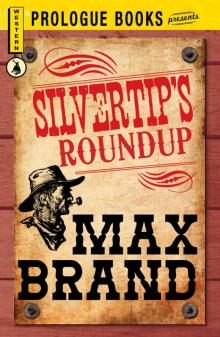 Silvertip's Roundup
Silvertip's Roundup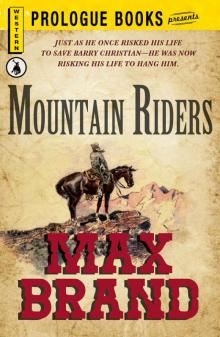 Mountain Riders
Mountain Riders Silvertip (1942)
Silvertip (1942)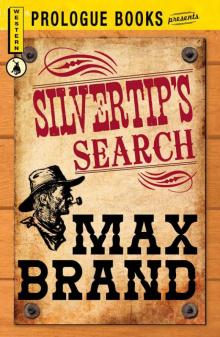 Silvertip's Search
Silvertip's Search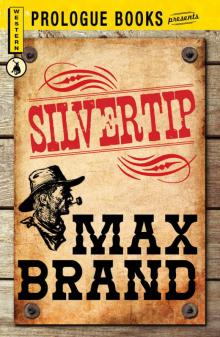 Silvertip
Silvertip Bull Hunter
Bull Hunter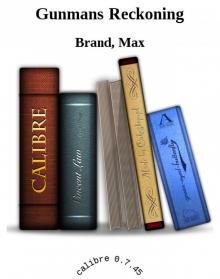 Gunmans Reckoning
Gunmans Reckoning The Seventh Man
The Seventh Man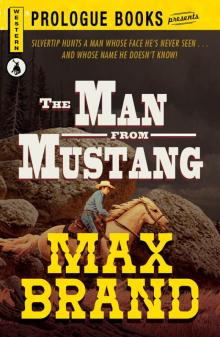 Man From Mustang
Man From Mustang Riders of the Silences
Riders of the Silences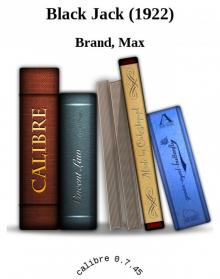 Black Jack (1922)
Black Jack (1922) Way of the Lawless
Way of the Lawless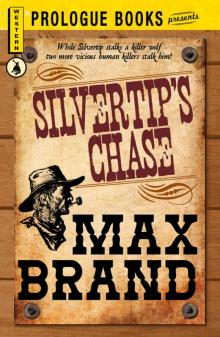 Silvertip's Chase
Silvertip's Chase Trailin
Trailin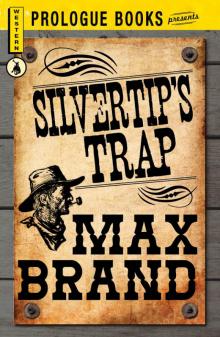 Silvertip's Trap
Silvertip's Trap Ronicky Doone (1921)
Ronicky Doone (1921) The Night Horseman
The Night Horseman the Garden Of Eden (1963)
the Garden Of Eden (1963)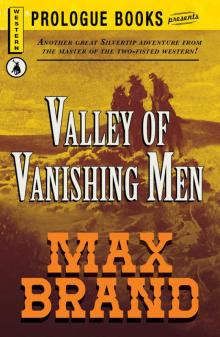 Valley of the Vanishing Men
Valley of the Vanishing Men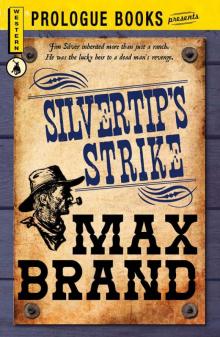 Silvertip's Strike
Silvertip's Strike Black Jack
Black Jack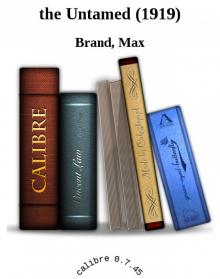 the Untamed (1919)
the Untamed (1919) Way Of the Lawless (1921)
Way Of the Lawless (1921) The Untamed
The Untamed